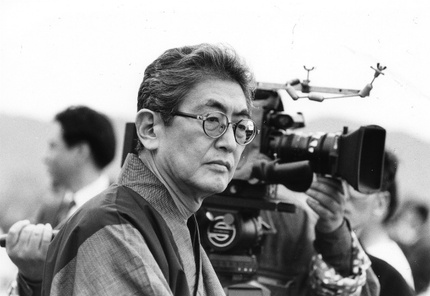Japanese Provocateur Ôshima Nagisa Passes Away at 80

In the late 50's and early 60's he made several films which walked an interesting line between neo-realism and sensationalist melodrama, chronicling the tribulations of the rebels and loners living in the margins of post-war Japan. My favorite of these is Cruel Story of Youth, which plays like a sort of tougher, culturally conscious companion piece to other angry-teenager films like Rebel Without a Cause.
In the late 60's, he became more experimental and overtly political, quickly cranking out a number films with half-cocked narratives that played like a mix of pop art, polemics and sexual transgression. How experimental? In his pointed critique of Japanese xenophobia, Three Resurrected Drunkards, he actually starts the movie over and repeats the entire first ten minutes. Even several months ago when I first watched the movie with a group of friends, this move prompted a fair amount of anger in the audience at my apartment.
Indeed, many of his films from this part of his career still feel audacious, brisk and daring even today. Also, credit him for giving every movie in this period a completely amazing title. To wit: Pleasures of the Flesh, Violence at Noon, Band of Ninja, Sing a Song of Sex, Japanese Summer: Double Suicide, Death by Hanging, Three Resurrected Drunkards.
During the 60's he was sometimes called the Japanese Jean Luc-Godard, but I still find this comparison lazy and reductive. While his films indeed mix politics, and a pop sensibility with experiments in form and style, there is a sense of raw urgency and anger in Ôshima's films that make them feel far removed from anything that came out of France during the same period.
His career continued with up's and down's until his most notorious film, In the Realm of the Senses. He followed that up with a more low-key but totally worthwhile companion piece, Empire of Passion. He tried a few films in foreign countries -- the bizarre David Bowie war film Merry Christmas Mr. Lawrence and the equally peculiar chimpanzee love story Max Mon Amour -- then took a break from filmmaking. He returned with the stylized, homo-erotic samurai film Taboo in 1999, which would be his final film.
Ôshima's films have meant a lot to me ever since I was haunted for days by The Man Who Left His Will on Film, nearly ten years ago. As I've worked through his filmography in the ensuing years, his films have continually astounded me, perplexed me and challenged the way I thought about cinema. I still don't believe there is any other filmmaker who has managed to make films that are so direct and confrontational while simultaneously experimental, and even playful.
And so, in honor of his passing, I leave you with a clip from The Man Who Left His Will on Film, a challenging, often perplexing film about a student activist who commits suicide by jumping off a building... with his 16mm camera running. It was the first of many Oshima films to completely blow my mind.
Sadly, I could not find the scene later in the film where the dead student's girlfriend pleasures herself while projecting the film of his death onto her naked body, but I still hope you enjoy this clip of the deceased's friend trying to steal his friend's camera from the police.

Do you feel this content is inappropriate or infringes upon your rights? Click here to report it, or see our DMCA policy.






